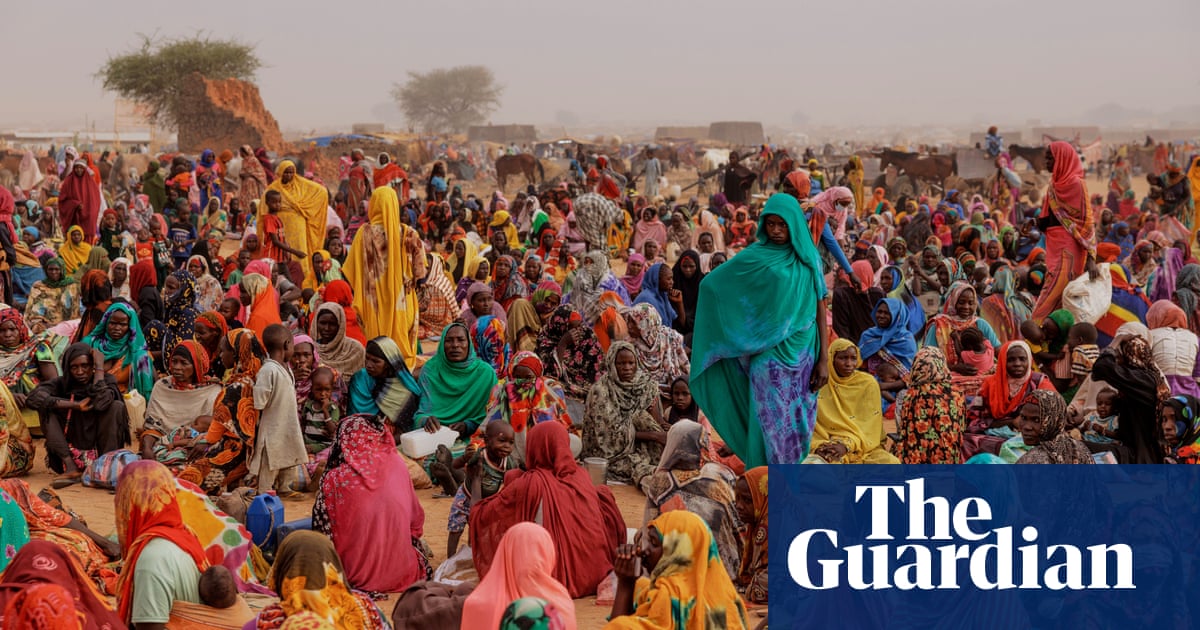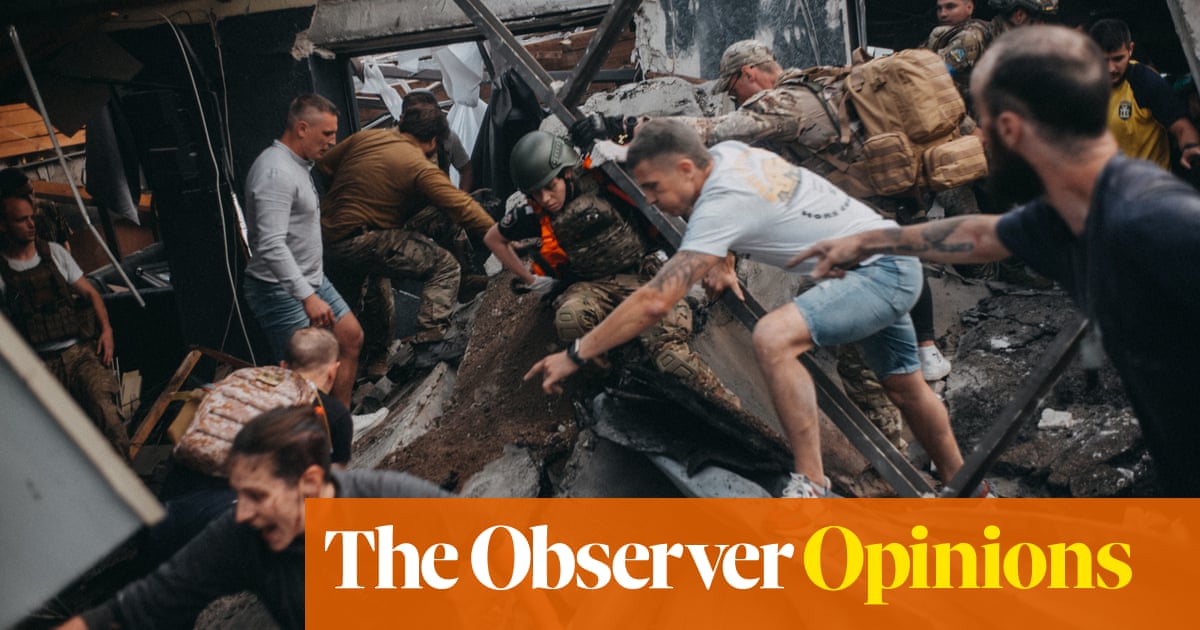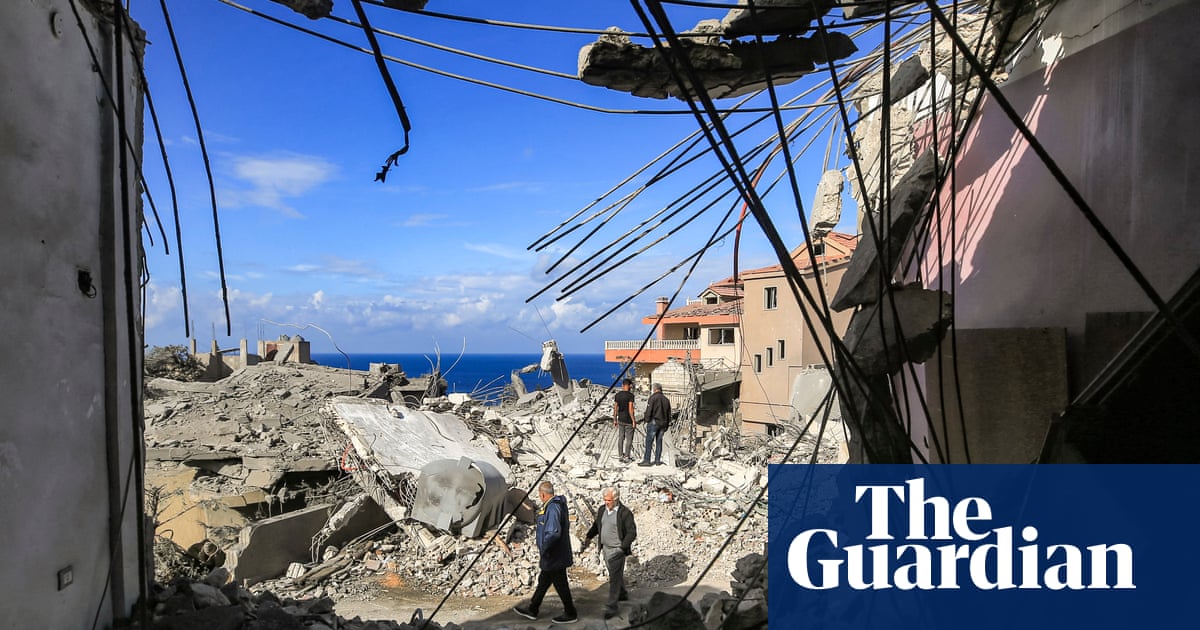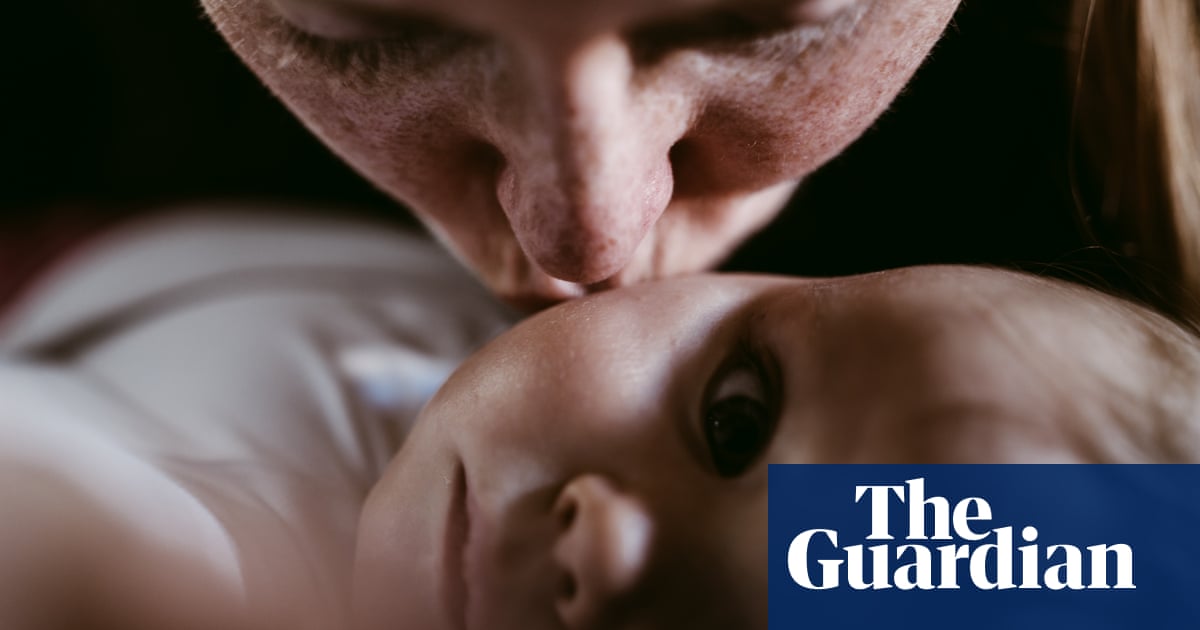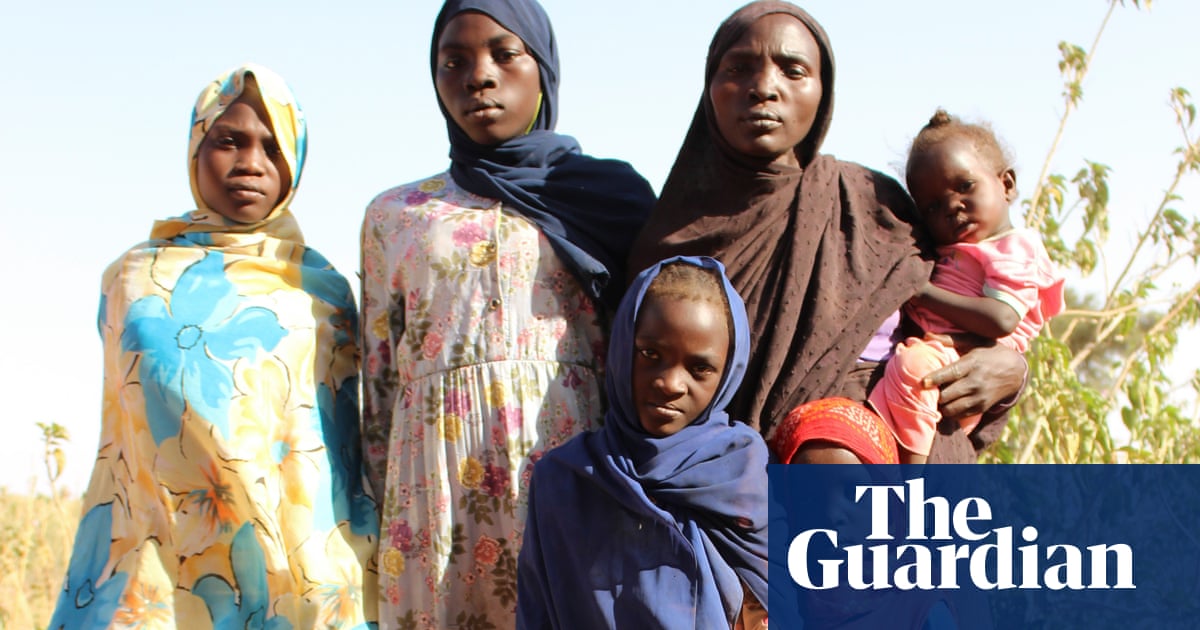
They burst into the room, yanking the boy from under a bed. His brown eyes wide open with terror, they put a gun to his temple. Two shots. Nadifa Ismail ran towards the body, but the intruders shoved the mother out of her home. Moments later, armed men set it ablaze, cremating her child’s body, destroying everything she had.
Weeks later, at 4pm on 28 February in Sudan’s Darfur region, Nadifa, her clothing streaked red with dust, passed the paramilitary group who had executed her 16-year-old son shortly after breakfast.
“Hopefully it is the last time I will see them,” she said. “They beat me too.”
Nadifa was the 212th person that day to make it through the border crossing and into the town of Adré in eastern Chad.
Like those who had gone before, the 38-year-old offered detailed testimony that fresh atrocities are happening in Darfur, a vast region in the west of Sudan.
The latest arrivals offer further evidence of ethnic cleansing in Darfur’s unfolding dystopian nightmare. Women raped in front of their children, daughters raped in front of their mothers. Boys shot in the street. Others dragged away and never seen again.
Their statements crystallise concerns that the Rapid Support Forces (RSF) – the powerful paramilitary group in Sudan that killed Nadifa’s son – along with other allied Arab militia, remain intent on completing the genocide against the Masalit community, a darker-skinned African tribe, which began 20 years ago.
Those able to share their experiences are the fortunate ones: latest accounts describe a region sealed off with innumerable checkpoints and roving RSF kill squads.
For the first seven weeks of 2024 Nadifa, a Masalit, and her surviving children, five girls, lived on the run, sheltering in abandoned homes, once a derelict school, dodging the militias.
They escaped as Sudan’s civil war nears its first anniversary next month, a conflict only intensifying as foreign powers wrestle for influence within the strategic African nation.
But Nadifa has merely swapped one hellish existence for another. Her family made it to Chad at the same time as the world turned its back.
International aid has collapsed. Global leadership, long conspicuous by its absence, has drained to nothing. Taken as a whole, the response raises questions over the viability of the international humanitarian system.
But senior UN officials also warn that the “abandonment” of Chad poses profound challenges, not only for Africa but soon also for Europe.
From Darfur, it’s a 10-minute walk through the sand-engulfed lanes of Adré to the first of Chad’s many refugee camps. Between them, they hold more than a million people with at least 554,000 Sudanese having crossed the border since last April.
Chad, one of the world’s five poorest countries, now has more refugees per capita than anywhere else in Africa. Numbers tick upwards by the minute, and as need escalates, help has melted away.
Nadifa and her children will exist hand to mouth in Adré’s makeshift shelters. All the official refugee camps are full.
To cope with the crisis in Chad, the UN’s refugee agency required $319.5m (£250m) this year. So far, it has received just 4% of that.
Across the border, things are no better. A separate UN appeal for humanitarian funding in Sudan has also garnered less than 4% of what is needed.
Refugees will go hungry. The UN’s World Food Programme (WFP) has warned that lifesaving programmes in Chad will come to a halt as funds run out.
The WFP needs $242m to support Chad over the next six months. As of 13 March it had not received a penny. Denied support, the humanitarian response is equivalent to battling a raging inferno as the water hoses run dry.
Chad’s refugees are stranded in the desert with dwindling food supplies, zero prospects and little hope of returning home.
“We’ve saved a lot of people from catastrophe, but have we given them a new life? Hope?” says a senior UNHCR official in Chad. “A teenager will understand in hours that here, there is no future.”
Europe, for many, increasingly represents a future. Reports from one refugee camp in eastern Chad, holding 40,000 people, suggest the exodus is under way.
UN officials have heard that since the beginning of this year, 24 of the camp’s former occupants drowned in the Mediterranean. Another 80 were detained in Libya. Up to 2,000, refugee representatives claimed, had made it to Europe.
Senior UN figures have noted the significance, even if the statistics have not been verified. “Unless the west invests, the movement of Sudanese refugees from Chad is going to explode,” one says.
In the last six months of 2023, the numbers of Sudanese people arriving in Italy rose 456% on the previous year, to more than 5,000.
Last July, as Sudan’s war intensified and Chad’s refugee population increased, Italy’s prime minister Giorgia Meloni hosted a conference in Rome on tackling migration from Africa.
More than 20 countries were present, documents reveal. Chad and Sudan were, however, not among them. Officials from Chad lobbied for an invite, sources claim, but were refused.
More than six months ago, the World Bank’s managing director for operations, Anna Bjerde, visited a refugee camp in eastern Chad called Forchana, and announced $340m in “new financing” to help Chad “address multiple shocks”.
Yet the money appears to have not materialised. “Where is it? Has it gone somewhere else?” asks one aid official in Forchana.
When asked if any of the funding had arrived in Chad, the World Bank did not respond.
It is not the only high-profile announcement that appears to have had little impact.
Weeks after the World Bank visit, the EU unveiled a deal with Tunisia to tackle migration, including $105m to strengthen borders and return refugees to places such as Chad. Nearly 200 days later it is unclear if any Sudanese have been returned from Tunisia, the departure point for most sea arrivals in Italy.
More apparent, according to several UN sources, is that the controversial deal is in disarray. Far from creating the artificial border in Africa that Europe wanted, Tunisia appears to be struggling with hosting migrants already. “We have no money, no available shelter: everybody’s wandering the streets,” says a UN source.
Another project to repatriate refugees in Tunisia was unveiled in December, this time co-funded by Meloni and the UK prime minister Rishi Sunak.
This week, the Home Office would not disclose how much money the UK had actually pledged.
Simultaneously, the UK is also hoping to limit African migration from Tunisia’s neighbour Libya, announcing on 8 March a “substantial financial package” to return refugees. However, the £1m pledged would pay the bill of housing asylum seekers in UK hotels for less than three hours.
And the EU – one of Chad’s biggest donors – has decided to reduce funding this year, so far allocating 20% less than in 2023. Analysts say there is a spike in donor fatigue as Gaza and Ukraine are taking up all the room.
Kelly Clements, the deputy high commissioner of the UN’s refugee agency, believes the global humanitarian model may have reached a crossroads, revealing that elements of the international community were starting to tire of the concept of need.
“I was told last year [by donors] that need as a concept is something that is not selling enough to evoke a response,” she says.
Another UN official in central Africa adds: “The world is wilfully ignoring a crisis that will affect us all. I get Gaza and Ukraine, but for whom is Chad a priority?”
It was another Monday morning and Huda Suleiman was making omelette for breakfast. Shortly after 8am her home in Ardamata, a Masalit neighbourhood in west Darfur, shuddered violently. Panicking, the 34-year-old and her three children ran outside, Huda quickly losing them in the clouds of debris from the nearby explosion.
A group of militia emerged through the dust. One carried a large axe. He asked: “Are you a Masalit?”
Huda nodded, immediately the men began beating her with clubs.
“Then they dragged me into a neighbour’s house, the four of them took it in turns to rape me.”
Afterwards, frozen with shock, Huda realised that two of her children, aged 13 and 16, had been hiding in a toilet beside where she had been raped. They had watched the attack.
“For their sake I got myself together,” she says. “But inside I wanted to die.”
For several days they hid in Ardamata, waiting for her eldest son, 19, to return after disappearing during the attack.
It was a tense wait. A month earlier, in November 2023, the RSF had embarked on an ethnic rampage through Ardamata, killing hundreds of Masalit civilians, torturing others. Videos show Masalits being whipped and rounded up.
Huda was convinced the RSF would return. “They were going through the neighbourhood, killing the men, attacking the women who were left.”
Her son never came home. After dark, on 8 December, Huda set off for Chad, carried by her surviving children. Three months on, her trauma is undimmed.
“When upset, I feel physical pain from being raped,” she says, looking east towards Darfur, less than half a mile away.
The ad hoc refugee camp at Adré is unsafe, perpetually under threat from the risk of cross-border RSF raids. Yet 160,000 refugees are stranded here, 20,000 more than when Huda arrived.
Zahra Amna runs a well-attended support centre here for sexual violence survivors. Recently she documented an influx of Masalit from deeper inside Darfur, a town called Kreinik.
“They are never going back,” she says. “The RSF is telling them, ‘You must go to Chad. You do not belong here.’”
Few men make it to Chad. Most have been killed or disappeared. Adré’s refugees are 90% women and children.
Fatim Khalil, 20, says women keep arriving who had been raped attempting to reach the border. “But they are only killing one tribe: the Masalit.”
No one knows how many Masalit remain in Darfur: many are undoubtedly trapped. Details of perilous escapes are widespread among those at Adré. Families describe cowering for weeks in scrubland, living off what they can scavenge, hunted by roving RSF.
Aziza Baraka arrived on 27 February after she and her children were beaten when they were caught working at a brick factory. “They are still killing people,” she says. “We had to leave.”
Lying beneath boxes in a lorry, Aziza counted at least five armed checkpoints from west Darfur’s capital, Geneina. The driver had to pay a bribe to get through each one.
One man who made it, Younis Abakar, also reached Chad hidden in the bottom of a truck. “Through a gap I saw people being beaten,” he says. “Some were killed.” At an Arab village called Adikong, close to Chad, bodies lined the road. “So many, they were uncountable.”
Another woman, Awatif Abdullah, recounted repeated racist abuse as she fled from Ardamata. “Blacks! Go!” She was raped by an RSF fighter who, at gunpoint, forced the 28-year-old into a bedroom and locked the door. Throughout the attack, her mother tried in vain to break in. “I was screaming for her,” says Abdullah, “She was shouting, ‘Take me! Take me!’”
It was standing room only in Farchana’s morning lessons. Outside, more pupils huddled under the sparse shade of a tree as temperatures touched 44C. Classes are unfailingly oversubscribed in Chad’s refugee camp. Nadifa Ismail’s children learn in tarpaulin classrooms crammed with 130 peers.
“The sense of aspiration is unbelievable,” says an aid worker. “They believe that education is the key to a better life, they all talk of getting to Europe.”
One factor likely to influence how many get there are recent changes to the smugglers’ business model. Rather than pay upfront, UN sources in Chad say that refugees are now told to pay when they get to Europe.
Meanwhile, many more refugees are forecast to reach Chad. Last month the Sudanese military banned aid agencies from delivering vital supplies into Darfur, a move that could provoke a fresh exodus.
Antony Spalton of Unicef warns that 240,000 children in Darfur are at “high risk” of death from malnutrition if the blockade isn’t lifted.
Elsewhere, geopolitics continue to inflame Sudan’s disastrous war. Iran appears increasingly involved, backing the Sudanese military against the RSF, itself allegedly supported by the United Arab Emirates as proxies battle for Red Sea access.
On 27 February, Chad’s minister of foreign affairs, Mahamat Saleh Annadif, told officials that Tehran’s growing presence would mean a more protracted conflict. It will also compromise the UK government’s diplomatic influence at a time its political leadership over the crisis is questioned.
During Darfur’s genocide 20 years ago, Tony Blair said Britain had a “moral responsibility” to act, even threatening possible military intervention. Sunak has not said a word on Darfur, or its genocide. Neither has he referenced the unfolding crisis in Chad.
Current Foreign Office spending on development programmes in Chad stands at £3.04m, a 5% the amount received by South Sudan, the only country ranked below it on the Human Development Index.
In Chad, hope continues to fade. Laura Lo Castro, the country’s UNHCR representative, says a sense of optimism had prevailed before last year’s migration talks in Rome and the failed ceasefire negotiations in Saudi Arabia to end Sudan’s bloodshed.
“The outlook’s not good,” she says. “That glimpse of hope has gone. Staff are exhausted. Maybe we have to accept the money is not coming.”




